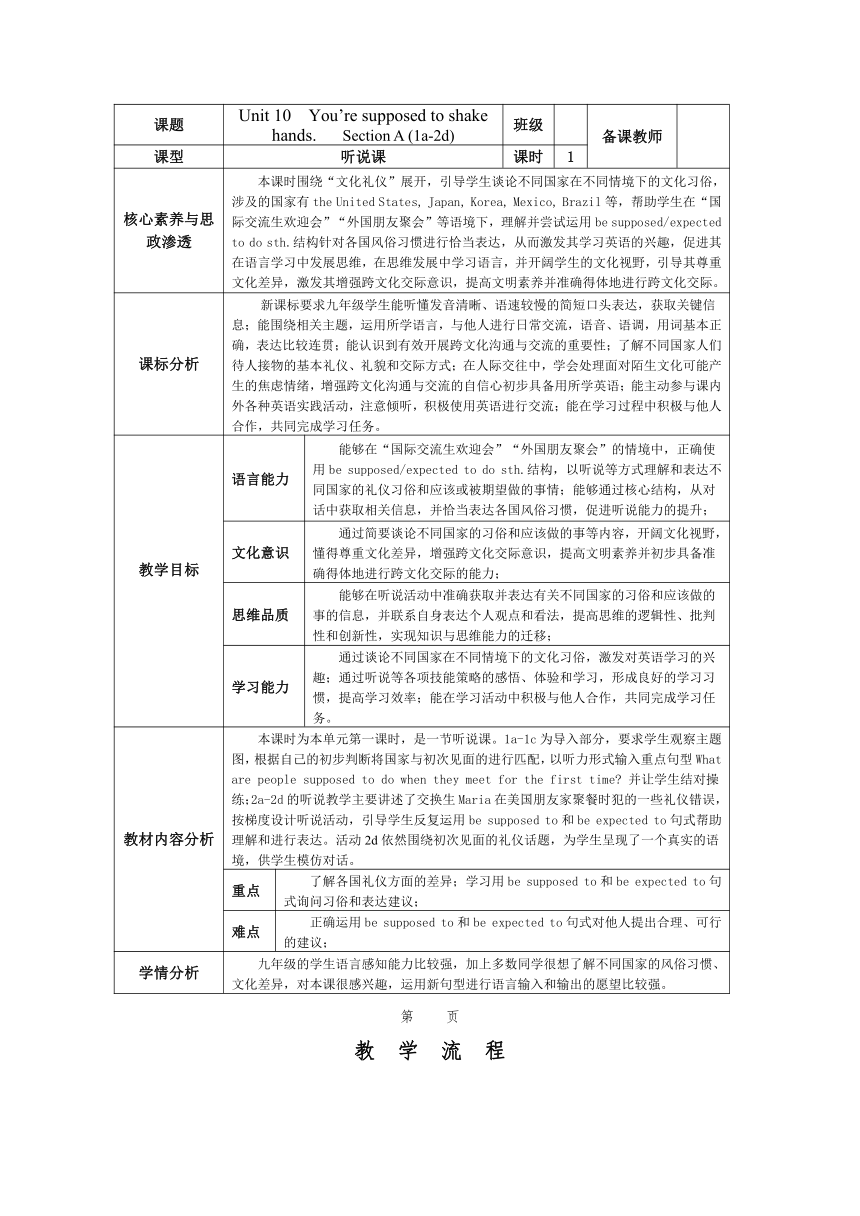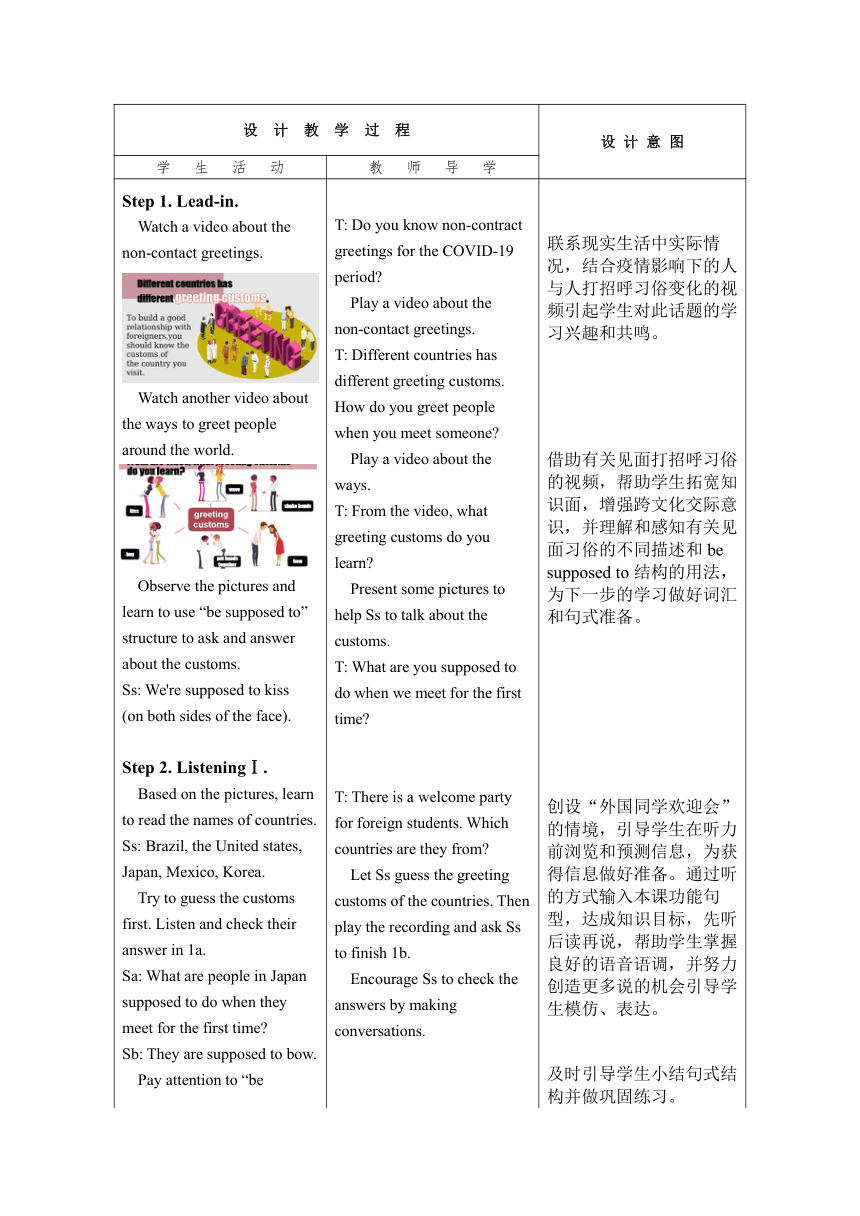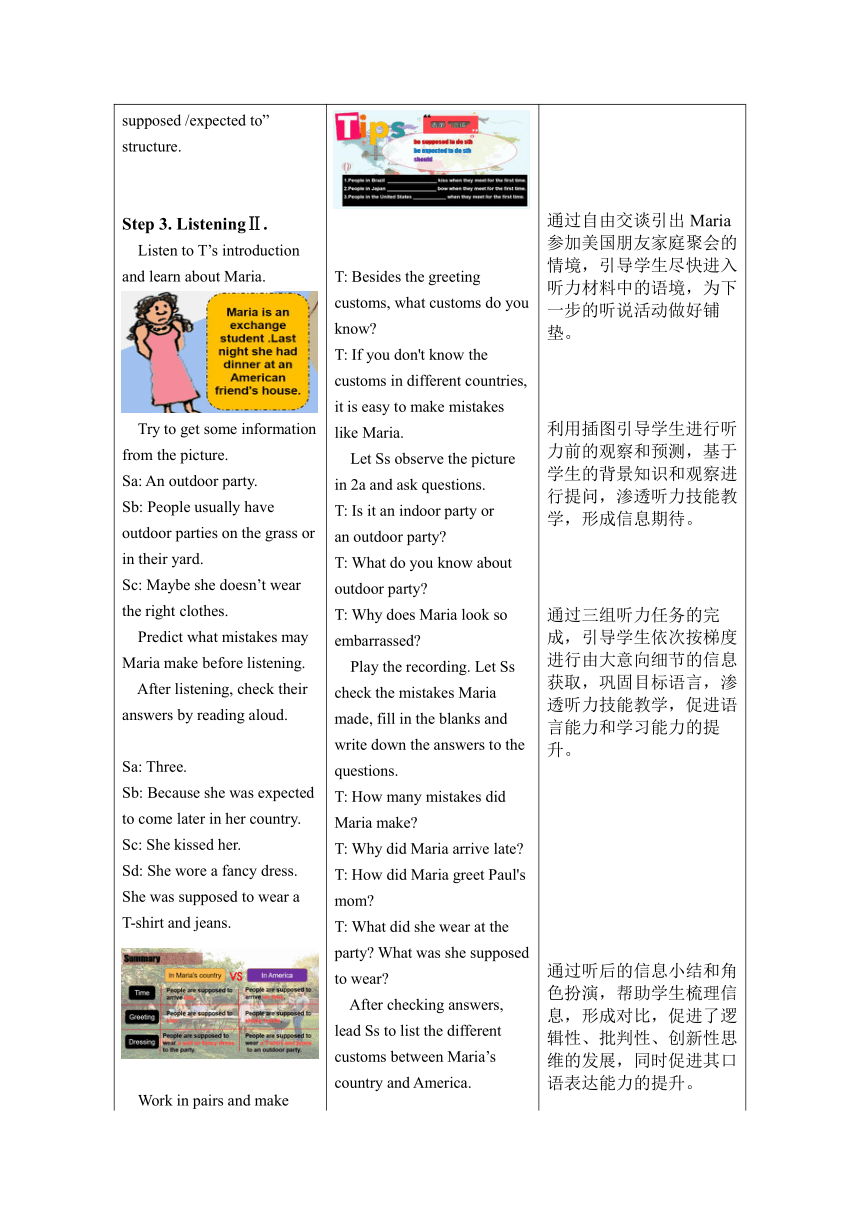【核心素养目标】Unit 10 You’re supposed to shake hands. Section A (1a-2d)表格式教案
文档属性
| 名称 | 【核心素养目标】Unit 10 You’re supposed to shake hands. Section A (1a-2d)表格式教案 |

|
|
| 格式 | docx | ||
| 文件大小 | 1.5MB | ||
| 资源类型 | 教案 | ||
| 版本资源 | 人教新目标(Go for it)版 | ||
| 科目 | 英语 | ||
| 更新时间 | 2024-09-24 00:00:00 | ||
图片预览



文档简介
课题 Unit 10 You’re supposed to shake hands. Section A (1a-2d) 班级 备课教师
课型 听说课 课时 1
核心素养与思政渗透 本课时围绕“文化礼仪”展开,引导学生谈论不同国家在不同情境下的文化习俗,涉及的国家有the United States, Japan, Korea, Mexico, Brazil等,帮助学生在“国际交流生欢迎会”“外国朋友聚会”等语境下,理解并尝试运用be supposed/expected to do sth.结构针对各国风俗习惯进行恰当表达,从而激发其学习英语的兴趣,促进其在语言学习中发展思维,在思维发展中学习语言,并开阔学生的文化视野,引导其尊重文化差异,激发其增强跨文化交际意识,提高文明素养并准确得体地进行跨文化交际。
课标分析 新课标要求九年级学生能听懂发音清晰、语速较慢的简短口头表达,获取关键信息;能围绕相关主题,运用所学语言,与他人进行日常交流,语音、语调,用词基本正确,表达比较连贯;能认识到有效开展跨文化沟通与交流的重要性;了解不同国家人们待人接物的基本礼仪、礼貌和交际方式;在人际交往中,学会处理面对陌生文化可能产生的焦虑情绪,增强跨文化沟通与交流的自信心初步具备用所学英语;能主动参与课内外各种英语实践活动,注意倾听,积极使用英语进行交流;能在学习过程中积极与他人合作,共同完成学习任务。
教学目标 语言能力 能够在“国际交流生欢迎会”“外国朋友聚会”的情境中,正确使用be supposed/expected to do sth.结构,以听说等方式理解和表达不同国家的礼仪习俗和应该或被期望做的事情;能够通过核心结构,从对话中获取相关信息,并恰当表达各国风俗习惯,促进听说能力的提升;
文化意识 通过简要谈论不同国家的习俗和应该做的事等内容,开阔文化视野,懂得尊重文化差异,增强跨文化交际意识,提高文明素养并初步具备准确得体地进行跨文化交际的能力;
思维品质 能够在听说活动中准确获取并表达有关不同国家的习俗和应该做的事的信息,并联系自身表达个人观点和看法,提高思维的逻辑性、批判性和创新性,实现知识与思维能力的迁移;
学习能力 通过谈论不同国家在不同情境下的文化习俗,激发对英语学习的兴趣;通过听说等各项技能策略的感悟、体验和学习,形成良好的学习习惯,提高学习效率;能在学习活动中积极与他人合作,共同完成学习任务。
教材内容分析 本课时为本单元第一课时,是一节听说课。1a-1c为导入部分,要求学生观察主题图,根据自己的初步判断将国家与初次见面的进行匹配,以听力形式输入重点句型What are people supposed to do when they meet for the first time 并让学生结对操练;2a-2d的听说教学主要讲述了交换生Maria在美国朋友家聚餐时犯的一些礼仪错误,按梯度设计听说活动,引导学生反复运用be supposed to和be expected to句式帮助理解和进行表达。活动2d依然围绕初次见面的礼仪话题,为学生呈现了一个真实的语境,供学生模仿对话。
重点 了解各国礼仪方面的差异;学习用be supposed to和be expected to句式询问习俗和表达建议;
难点 正确运用be supposed to和be expected to句式对他人提出合理、可行的建议;
学情分析 九年级的学生语言感知能力比较强,加上多数同学很想了解不同国家的风俗习惯、文化差异,对本课很感兴趣,运用新句型进行语言输入和输出的愿望比较强。
第 页
教 学 流 程
设 计 教 学 过 程 设 计 意 图
学 生 活 动 教 师 导 学
Step 1. Lead-in. Watch a video about the non-contact greetings. Watch another video about the ways to greet people around the world. Observe the pictures and learn to use “be supposed to” structure to ask and answer about the customs. Ss: We're supposed to kiss (on both sides of the face). Step 2. ListeningⅠ. Based on the pictures, learn to read the names of countries. Ss: Brazil, the United states, Japan, Mexico, Korea. Try to guess the customs first. Listen and check their answer in 1a. Sa: What are people in Japan supposed to do when they meet for the first time Sb: They are supposed to bow. Pay attention to “be supposed /expected to” structure. Step 3. ListeningⅡ. Listen to T’s introduction and learn about Maria. Try to get some information from the picture. Sa: An outdoor party. Sb: People usually have outdoor parties on the grass or in their yard. Sc: Maybe she doesn’t wear the right clothes. Predict what mistakes may Maria make before listening. After listening, check their answers by reading aloud. Sa: Three. Sb: Because she was expected to come later in her country. Sc: She kissed her. Sd: She wore a fancy dress. She was supposed to wear a T-shirt and jeans. Work in pairs and make conversations between Maria and Dan. Sa: How was the dinner at Pual's house last night Sb: Well, it was OK, but I made some mistakes. I was supposed to... Step 4. Role-play. Listen to the conversation and answer the questions. Read the conversation by following the recording. Then role-play the dialogue in pairs. Show their work in class. Close the book and finish the conversation. Sa: People in France are expected to kiss on both sides of the face. Sb: People in Japan are supposed to bow to each other. Step 5. Summary. Listen to T to explain the language points and do some exercises. T: Do you know non-contract greetings for the COVID-19 period Play a video about the non-contact greetings. T: Different countries has different greeting customs. How do you greet people when you meet someone Play a video about the ways. T: From the video, what greeting customs do you learn Present some pictures to help Ss to talk about the customs. T: What are you supposed to do when we meet for the first time T: There is a welcome party for foreign students. Which countries are they from Let Ss guess the greeting customs of the countries. Then play the recording and ask Ss to finish 1b. Encourage Ss to check the answers by making conversations. T: Besides the greeting customs, what customs do you know T: If you don't know the customs in different countries, it is easy to make mistakes like Maria. Let Ss observe the picture in 2a and ask questions. T: Is it an indoor party or an outdoor party T: What do you know about outdoor party T: Why does Maria look so embarrassed Play the recording. Let Ss check the mistakes Maria made, fill in the blanks and write down the answers to the questions. T: How many mistakes did Maria make T: Why did Maria arrive late T: How did Maria greet Paul's mom T: What did she wear at the party What was she supposed to wear After checking answers, lead Ss to list the different customs between Maria’s country and America. Provide the beginning of the conversation and let Ss play the roles of Maria and Dan. Two minutes later, invite some pairs to show their conversations. Introduce John to Ss. T: What funny things do John and Katie talk about Ask Ss to work in pairs and play the roles of John and Katie. Invite two pairs to act out. Give comments according to the evaluation. (loudly, clearly and with expression) Provide the conversation with some vocabulary missing for Ss to complete. Guide Ss to sum up the customs in different countries. T: What can you learn from the conversation 联系现实生活中实际情况,结合疫情影响下的人与人打招呼习俗变化的视频引起学生对此话题的学习兴趣和共鸣。 借助有关见面打招呼习俗的视频,帮助学生拓宽知识面,增强跨文化交际意识,并理解和感知有关见面习俗的不同描述和be supposed to结构的用法,为下一步的学习做好词汇和句式准备。 创设“外国同学欢迎会”的情境,引导学生在听力前浏览和预测信息,为获得信息做好准备。通过听的方式输入本课功能句型,达成知识目标,先听后读再说,帮助学生掌握良好的语音语调,并努力创造更多说的机会引导学生模仿、表达。 及时引导学生小结句式结构并做巩固练习。 通过自由交谈引出Maria参加美国朋友家庭聚会的情境,引导学生尽快进入听力材料中的语境,为下一步的听说活动做好铺垫。 利用插图引导学生进行听力前的观察和预测,基于学生的背景知识和观察进行提问,渗透听力技能教学,形成信息期待。 通过三组听力任务的完成,引导学生依次按梯度进行由大意向细节的信息获取,巩固目标语言,渗透听力技能教学,促进语言能力和学习能力的提升。 通过听后的信息小结和角色扮演,帮助学生梳理信息,形成对比,促进了逻辑性、批判性、创新性思维的发展,同时促进其口语表达能力的提升。 通过听力回答问题,让学生对对话内容从整体感知到细节理解,做到最大程度的掌握。 通过角色扮演让学生进一步巩固be supposed to结构,并关注语音语调、肢体语言等。 通过对话填空,引导学生关注细节性的语言点知识,在语言内化和能力提升中兼顾基础知识的落实。 通过内容小结,引导学生关注语篇意义,加深对于不同国家习俗内容的记忆。 渗透入乡随俗的理念,进行知识点的处理。
第 页
课 时 达 标 检 测
Ⅰ. 根据句意及汉语提示完成句子。 1.Serving a cup of tea is a very popular (习俗) in China. 2.She was (迎接) her friends at the door. 3.Before going to bed, the parents often (亲吻) their son and say “Good night” to him. 4.People in Korea are expected to (鞠躬) when they meet the elder. Ⅱ. 根据汉语意思完成句子。 5杰克一放学回家就开始写作业。 Jack started doing his homework he got home from school. 6.我们将在周五晚上为我们的新物理老师举行一场欢迎会。 We'll have a for our new physics teacher on Friday evening. 7.那个小孩伸出双手,开心地接过他的生日礼物。 The kid his hands and got his birthday gift happily. Ⅲ. 补全对话,有两项为多余项。 A.That's not true. B.For about three months. C.How do you celebrate it D.I believe you will love it. E.You mean in your hometown F.I can't wait for the coming of that day. G.If so, you can come to celebrate it with my family.
第 页
课 时 教 学 设 计 尾 页
板 书 设 计
Unit 10 You’re supposed to shake hands. (Section A 1a-2d)
作 业 设 计
Level A Search for more customs about what people in different countries are supposed to do when they meet for the first time. Write a short passage about the customs you have known or learned. Try to use “be supposed to” or “be expected to”. e.g. People in different countries do different things when they meet for the first time. In China, ...
Level B Write at least five sentences to introduce the customs about what people in different countries are supposed to do when they meet for the first time.
教 学 反 思
第 页
课型 听说课 课时 1
核心素养与思政渗透 本课时围绕“文化礼仪”展开,引导学生谈论不同国家在不同情境下的文化习俗,涉及的国家有the United States, Japan, Korea, Mexico, Brazil等,帮助学生在“国际交流生欢迎会”“外国朋友聚会”等语境下,理解并尝试运用be supposed/expected to do sth.结构针对各国风俗习惯进行恰当表达,从而激发其学习英语的兴趣,促进其在语言学习中发展思维,在思维发展中学习语言,并开阔学生的文化视野,引导其尊重文化差异,激发其增强跨文化交际意识,提高文明素养并准确得体地进行跨文化交际。
课标分析 新课标要求九年级学生能听懂发音清晰、语速较慢的简短口头表达,获取关键信息;能围绕相关主题,运用所学语言,与他人进行日常交流,语音、语调,用词基本正确,表达比较连贯;能认识到有效开展跨文化沟通与交流的重要性;了解不同国家人们待人接物的基本礼仪、礼貌和交际方式;在人际交往中,学会处理面对陌生文化可能产生的焦虑情绪,增强跨文化沟通与交流的自信心初步具备用所学英语;能主动参与课内外各种英语实践活动,注意倾听,积极使用英语进行交流;能在学习过程中积极与他人合作,共同完成学习任务。
教学目标 语言能力 能够在“国际交流生欢迎会”“外国朋友聚会”的情境中,正确使用be supposed/expected to do sth.结构,以听说等方式理解和表达不同国家的礼仪习俗和应该或被期望做的事情;能够通过核心结构,从对话中获取相关信息,并恰当表达各国风俗习惯,促进听说能力的提升;
文化意识 通过简要谈论不同国家的习俗和应该做的事等内容,开阔文化视野,懂得尊重文化差异,增强跨文化交际意识,提高文明素养并初步具备准确得体地进行跨文化交际的能力;
思维品质 能够在听说活动中准确获取并表达有关不同国家的习俗和应该做的事的信息,并联系自身表达个人观点和看法,提高思维的逻辑性、批判性和创新性,实现知识与思维能力的迁移;
学习能力 通过谈论不同国家在不同情境下的文化习俗,激发对英语学习的兴趣;通过听说等各项技能策略的感悟、体验和学习,形成良好的学习习惯,提高学习效率;能在学习活动中积极与他人合作,共同完成学习任务。
教材内容分析 本课时为本单元第一课时,是一节听说课。1a-1c为导入部分,要求学生观察主题图,根据自己的初步判断将国家与初次见面的进行匹配,以听力形式输入重点句型What are people supposed to do when they meet for the first time 并让学生结对操练;2a-2d的听说教学主要讲述了交换生Maria在美国朋友家聚餐时犯的一些礼仪错误,按梯度设计听说活动,引导学生反复运用be supposed to和be expected to句式帮助理解和进行表达。活动2d依然围绕初次见面的礼仪话题,为学生呈现了一个真实的语境,供学生模仿对话。
重点 了解各国礼仪方面的差异;学习用be supposed to和be expected to句式询问习俗和表达建议;
难点 正确运用be supposed to和be expected to句式对他人提出合理、可行的建议;
学情分析 九年级的学生语言感知能力比较强,加上多数同学很想了解不同国家的风俗习惯、文化差异,对本课很感兴趣,运用新句型进行语言输入和输出的愿望比较强。
第 页
教 学 流 程
设 计 教 学 过 程 设 计 意 图
学 生 活 动 教 师 导 学
Step 1. Lead-in. Watch a video about the non-contact greetings. Watch another video about the ways to greet people around the world. Observe the pictures and learn to use “be supposed to” structure to ask and answer about the customs. Ss: We're supposed to kiss (on both sides of the face). Step 2. ListeningⅠ. Based on the pictures, learn to read the names of countries. Ss: Brazil, the United states, Japan, Mexico, Korea. Try to guess the customs first. Listen and check their answer in 1a. Sa: What are people in Japan supposed to do when they meet for the first time Sb: They are supposed to bow. Pay attention to “be supposed /expected to” structure. Step 3. ListeningⅡ. Listen to T’s introduction and learn about Maria. Try to get some information from the picture. Sa: An outdoor party. Sb: People usually have outdoor parties on the grass or in their yard. Sc: Maybe she doesn’t wear the right clothes. Predict what mistakes may Maria make before listening. After listening, check their answers by reading aloud. Sa: Three. Sb: Because she was expected to come later in her country. Sc: She kissed her. Sd: She wore a fancy dress. She was supposed to wear a T-shirt and jeans. Work in pairs and make conversations between Maria and Dan. Sa: How was the dinner at Pual's house last night Sb: Well, it was OK, but I made some mistakes. I was supposed to... Step 4. Role-play. Listen to the conversation and answer the questions. Read the conversation by following the recording. Then role-play the dialogue in pairs. Show their work in class. Close the book and finish the conversation. Sa: People in France are expected to kiss on both sides of the face. Sb: People in Japan are supposed to bow to each other. Step 5. Summary. Listen to T to explain the language points and do some exercises. T: Do you know non-contract greetings for the COVID-19 period Play a video about the non-contact greetings. T: Different countries has different greeting customs. How do you greet people when you meet someone Play a video about the ways. T: From the video, what greeting customs do you learn Present some pictures to help Ss to talk about the customs. T: What are you supposed to do when we meet for the first time T: There is a welcome party for foreign students. Which countries are they from Let Ss guess the greeting customs of the countries. Then play the recording and ask Ss to finish 1b. Encourage Ss to check the answers by making conversations. T: Besides the greeting customs, what customs do you know T: If you don't know the customs in different countries, it is easy to make mistakes like Maria. Let Ss observe the picture in 2a and ask questions. T: Is it an indoor party or an outdoor party T: What do you know about outdoor party T: Why does Maria look so embarrassed Play the recording. Let Ss check the mistakes Maria made, fill in the blanks and write down the answers to the questions. T: How many mistakes did Maria make T: Why did Maria arrive late T: How did Maria greet Paul's mom T: What did she wear at the party What was she supposed to wear After checking answers, lead Ss to list the different customs between Maria’s country and America. Provide the beginning of the conversation and let Ss play the roles of Maria and Dan. Two minutes later, invite some pairs to show their conversations. Introduce John to Ss. T: What funny things do John and Katie talk about Ask Ss to work in pairs and play the roles of John and Katie. Invite two pairs to act out. Give comments according to the evaluation. (loudly, clearly and with expression) Provide the conversation with some vocabulary missing for Ss to complete. Guide Ss to sum up the customs in different countries. T: What can you learn from the conversation 联系现实生活中实际情况,结合疫情影响下的人与人打招呼习俗变化的视频引起学生对此话题的学习兴趣和共鸣。 借助有关见面打招呼习俗的视频,帮助学生拓宽知识面,增强跨文化交际意识,并理解和感知有关见面习俗的不同描述和be supposed to结构的用法,为下一步的学习做好词汇和句式准备。 创设“外国同学欢迎会”的情境,引导学生在听力前浏览和预测信息,为获得信息做好准备。通过听的方式输入本课功能句型,达成知识目标,先听后读再说,帮助学生掌握良好的语音语调,并努力创造更多说的机会引导学生模仿、表达。 及时引导学生小结句式结构并做巩固练习。 通过自由交谈引出Maria参加美国朋友家庭聚会的情境,引导学生尽快进入听力材料中的语境,为下一步的听说活动做好铺垫。 利用插图引导学生进行听力前的观察和预测,基于学生的背景知识和观察进行提问,渗透听力技能教学,形成信息期待。 通过三组听力任务的完成,引导学生依次按梯度进行由大意向细节的信息获取,巩固目标语言,渗透听力技能教学,促进语言能力和学习能力的提升。 通过听后的信息小结和角色扮演,帮助学生梳理信息,形成对比,促进了逻辑性、批判性、创新性思维的发展,同时促进其口语表达能力的提升。 通过听力回答问题,让学生对对话内容从整体感知到细节理解,做到最大程度的掌握。 通过角色扮演让学生进一步巩固be supposed to结构,并关注语音语调、肢体语言等。 通过对话填空,引导学生关注细节性的语言点知识,在语言内化和能力提升中兼顾基础知识的落实。 通过内容小结,引导学生关注语篇意义,加深对于不同国家习俗内容的记忆。 渗透入乡随俗的理念,进行知识点的处理。
第 页
课 时 达 标 检 测
Ⅰ. 根据句意及汉语提示完成句子。 1.Serving a cup of tea is a very popular (习俗) in China. 2.She was (迎接) her friends at the door. 3.Before going to bed, the parents often (亲吻) their son and say “Good night” to him. 4.People in Korea are expected to (鞠躬) when they meet the elder. Ⅱ. 根据汉语意思完成句子。 5杰克一放学回家就开始写作业。 Jack started doing his homework he got home from school. 6.我们将在周五晚上为我们的新物理老师举行一场欢迎会。 We'll have a for our new physics teacher on Friday evening. 7.那个小孩伸出双手,开心地接过他的生日礼物。 The kid his hands and got his birthday gift happily. Ⅲ. 补全对话,有两项为多余项。 A.That's not true. B.For about three months. C.How do you celebrate it D.I believe you will love it. E.You mean in your hometown F.I can't wait for the coming of that day. G.If so, you can come to celebrate it with my family.
第 页
课 时 教 学 设 计 尾 页
板 书 设 计
Unit 10 You’re supposed to shake hands. (Section A 1a-2d)
作 业 设 计
Level A Search for more customs about what people in different countries are supposed to do when they meet for the first time. Write a short passage about the customs you have known or learned. Try to use “be supposed to” or “be expected to”. e.g. People in different countries do different things when they meet for the first time. In China, ...
Level B Write at least five sentences to introduce the customs about what people in different countries are supposed to do when they meet for the first time.
教 学 反 思
第 页
同课章节目录
- Unit 1 How can we become good learners.
- Section A
- Section B
- Unit 2 I think that mooncakes are delicious!
- Section A
- Section B
- Unit 3 Could you please tell me where the restroom
- Section A
- Section B
- Unit 4 I used to be afraid of the dark.
- Section A
- Section B
- Unit 5 What are the shirts made of?
- Section A
- Section B
- Review of Units 1-5
- Unit 6 When was it invented?
- Section A
- Section B
- Unit 7 Teenagers should be allowed to choose their
- Section A
- Section B
- Unit 8 It must belong to Carla.
- Section A
- Section B
- Unit 9 I like music that I can dance to.
- Section A
- Section B
- Unit 10 You're supposed to shake hands.
- Section A
- Section B
- Review of Units 6-10
- Unit 11 Sad movies make me cry.
- Section A
- Section B
- Unit 12 Life is full of the unexpected
- Section A
- Section B
- Unit 13 We're trying to save the earth!
- Section A
- Section B
- Unit 14 I remember meeting all of you in Grade 7.
- Section A
- Section B
- Review of Units 11-14
